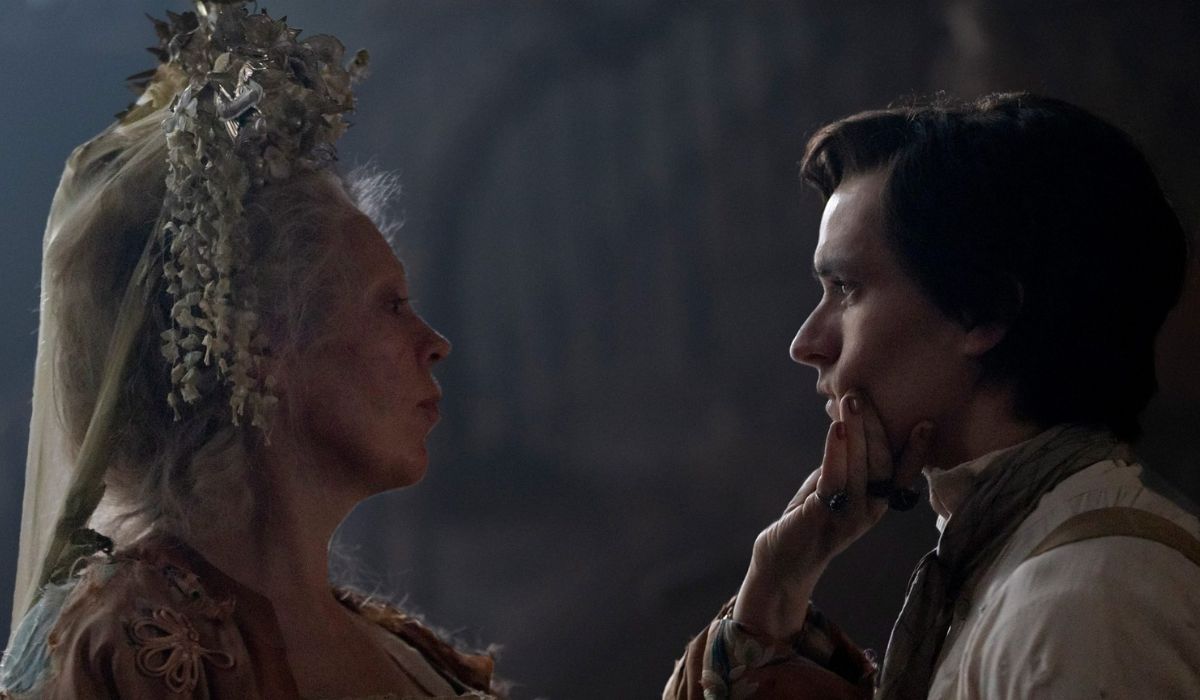 Olivia Colman as Miss Havisham and Fionn Whitehead as Pip. Source: BBC / cropped from original
Olivia Colman as Miss Havisham and Fionn Whitehead as Pip. Source: BBC / cropped from original
Sean Coote reviews the BBC’s latest adaptation of Dickens’ Great Expectations, finding that the novel’s themes about class resonate still
Steven Knight’s adaptation of Great Expectations is shaping to be a decent contemporary take on Dickens’ classic tale of aspiration and class movement, ideas that remain as relevant now as they were in 1861.
There have been to date something like eighteen screen adaptations, but familiarity shouldn’t be sufficient reason to dismiss another airing. Great stories, like great music, remain fundamentally undiminished by repeated renditions. It takes a special effort to ruin them entirely. The journey of Pip Pirrip from blacksmith’s mate to gentleman remains a great story, and there’s more than enough that resonates here to hold the attention.
Knight’s take is boldly contemporary. It retains the essential dynamic of the class movement, playing up the sneering attitude the middle classes show towards the aspirational working class, even those of high intelligence. And the middle classes aren’t alone in the depths of their prejudice. It’s clear from the offset Pip’s a youth who’s outgrown the restrictions of his situation. Over the forge, he quotes Twelfth Night. Whilst Joe the smith sees his recitals as a baffling amusement, his wife, Pip’s sister Sara (in the novel, she’s Georgiana Maria, just called Mrs. Joe), sees them as a challenge to the established class order, and is resentful to the point of physically beating him.
Something has to give, and it does
Pip declares a need to visit his parents, but it’s their graves he communes with on Christmas Eve. It’s here he meets Magwitch (you sense that in Johnny Harris’ interpretation, the character could do some real damage) the convicted thug awaiting (and escaping) transportation, but a man with enough humanity to recognise the decency in others.
Matt Berry’s Mr. Pumblechook (save us from Dickens’ names) acts as a benign bridgehead between social classes. His announcements at Christmas dinner mirror Dicken’s belief that the world would be a better place if only the mercantile classes would be more charitable to the working class (or those who live ‘downtown’, as Pumblechook puts it). But then Dickens was a moralist rather than a revolutionary, believing that society needed a change of spirit rather than one of structure, a position not untypical of the Victorian liberal reformer. It was as well that he knew how to tell a tale.
Pumblechook tells the gathered that he’s engineered a ‘meritocratic pairing’ between Pip and Estella, the adopted daughter of misanthropic recluse Miss Havisham. Like all good liberals, his charity (literally) comes at a price and takes no account of Pip’s actual aspirations. Sara, when she realises Pip’s class training will benefit her financially (thus elevating her own status) suddenly modifies her attitude towards Pip’s conspicuous literacy. Joe, essentially a decent working man, has naively expected Pip to stick around to inherit the forge (the vapours of the Gravesend marshes have got to his legs) and sees his dreams of semi-retirement and a quiet succession begin to evaporate.
Olivia Coleman’s spectral Miss Havisham makes her first appearance late in the day. More a predator than Dickens’ deranged and jilted spinster, her scheming has distinctly gothic, even perverse undertones.
And so it is Dickensian notions of charity that bring Pip opportunity. That he is told he has ‘a small window, but you’ll crawl through it’ finds its echo in Britain’s current condition, where genuine opportunity is more, and increasingly, bought than genuinely earned, where food banks are lauded as beacons of decency rather than the underbelly of a failing system, and where the size of the windows through which the likes of Pip must fit themselves are shrinking.
After correcting Pip on his grammar, Miss Havisham looks down at her newly paired-up charges and declares: ‘Common boy, and a proud, pretty girl … I want to watch you play…’
Steven Knight has figured his audience will take the same stance, and he may well be right: the first installment shows enough for us to persevere.
Before you go
Counterfire is growing faster than ever before
We need to raise £20,000 as we are having to expand operations. We are moving to a bigger, better central office, upping our print run and distribution, buying a new printer, new computers and employing more staff.

